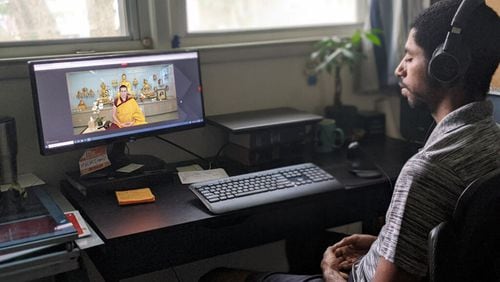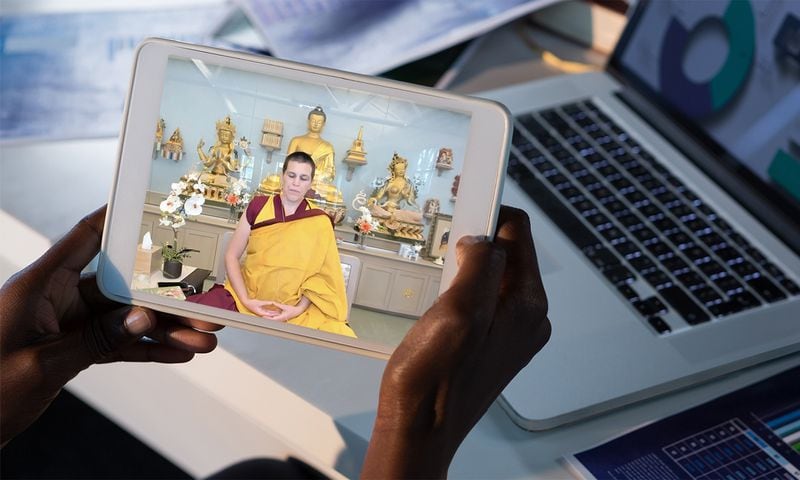Elin Begley didn’t believe meditation would work for her when she walked into the Kadampa Meditation Center Georgia for the first time 15 years ago. But the 46-year-old public health professional couldn’t resist giving it a try after witnessing how it made one of her friends seem happier and better able to tackle challenges.
Meditation, Begley said, has made her more resilient, empathetic and joyful. And it has helped her respond to stress more rationally and calmly — what she calls “space in the mind.” Those skills have come in handy for her in 2020.
“This year has been very stressful for a lot of people with the pandemic, the other unrest that’s going on in our society and just election craziness,” Begley said. “Given all of that, I think that it’s easy to feel overwhelmed, anxious or depressed.”
Studies show meditation can reduce stress, improve sleep, increase focus and help with pain, high blood pressure and other medical conditions, including ulcerative colitis. The number of American adults practicing meditation more than tripled between 2012 and 2017, according to data from the National Health Interview Survey, conducted by the National Institutes of Health.
For beginners, Begley recommends a daily five-minute breathing meditation based on four elements: a quiet location without distraction, a specific and comfortable posture, a focus on inhalation and exhalation and concentration.
“I found it very helpful this year, even more so. As even day to day things and situations change moment to moment,” she said. “It’s really been a very stabilizing effect on my mind.”
Credit: Kadampa Meditation Center
Credit: Kadampa Meditation Center
Want to give it a try? Consider these meditation centers, which have moved their practices online because of the COVID-19 outbreak. Or, if you prefer virtual meditation alone, apps like Headspace are available.
Kadampa Meditation Center Georgia
741 Edgewood NE, Atlanta
678-453-6753, info@meditationingeorgia.org
https://meditationingeorgia.org
Cost: Varies. Free classes offered. New member special, $25 first month.
This is a Buddhist meditation center, though you don’t have to be Buddhist to visit. Kadampa teaches higher wisdom, universal compassion, liberation from sorrow, how to solve human problems and the preciousness of human life. Classes offered seven days a week. Public meditations on Friday evenings and Saturday mornings are free.
Atlanta Soto Zen Center
1167 Zonolite Pl. NE, Atlanta
404-531-7070, aszcinfo@gmail.com
Cost: Free. Accepting donations.
Although it is open to people of all faiths, this center focuses on Soto Zen, one of the major Zen Buddhism sects. Soto Zen offers a public online meditation session every day except for Saturdays. On Wednesday evenings, the center offers a special session for newcomers: an online introduction to Soto Zen.
Shambhala Meditation Center of Atlanta
1447 Church St. Decatur
404-370-9650, info@atlantashambhalacenter.org
Cost: Free, accepting donations
Shambhala takes a non-religious approach and teaches how to cultivate courage, dignity and kindness. Newcomers are invited to an online open house on Sunday mornings. Those sessions consist of an hour of meditation and a half-hour discussion. Other sessions are offered every day of the week except Saturday.
Headspace
Download through the App Store or Google Play on any smartphone or tablet: headspace.com.
Cost: Free trial available. $12.99 a month or $69.99 a year. $9.99 a year for students.
With millions of users across 190 countries, this app makes meditation accessible for beginners with courses on appreciation, navigating change and self-esteem. Those courses also offer workout routines that incorporate mindfulness, music and sounds that aid in sleep and “SOS” sessions for quick relief.








